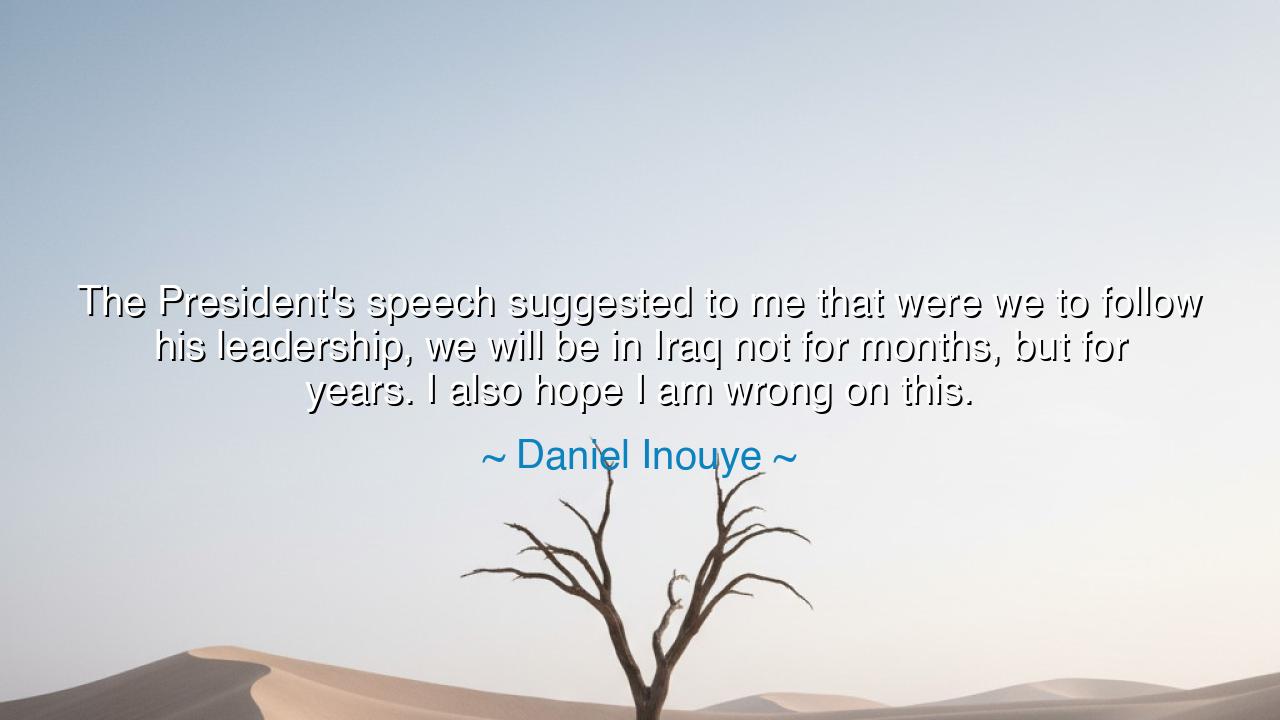
The President's speech suggested to me that were we to follow his
The President's speech suggested to me that were we to follow his leadership, we will be in Iraq not for months, but for years. I also hope I am wrong on this.






“The President's speech suggested to me that were we to follow his leadership, we will be in Iraq not for months, but for years. I also hope I am wrong on this.” – Daniel Inouye
When Daniel Inouye, a man of courage, sacrifice, and quiet honor, spoke these words, they carried not only the weight of political foresight but the ache of a soldier’s heart. A veteran of war and a guardian of peace, he had seen what few men dare to remember—the price that nations pay when they lose sight of the human cost of power. In this quote, his tone is not one of anger or defiance, but of sorrowful wisdom. He fears the blindness that comes when pride guides policy, when nations march into distant lands without knowing when—or if—they will return. His hope, humble and human, is that he is wrong. But his instinct, forged in blood and service, tells him he is not.
The origin of these words lies in the shadow of the Iraq War, when America’s path was clouded by uncertainty and ambition. Inouye, a United States Senator and decorated World War II veteran, knew the sound of destiny disguised as rhetoric. He had once followed orders into battle and lost his right arm in the fight against tyranny. Yet in his later years, he learned that not all wars are fought for freedom—some are fought for illusion, some for pride, and some because men forget the lessons of history. His words were not a condemnation of leaders, but a plea for reflection—a reminder that leadership without wisdom can bind generations to suffering.
Throughout the ages, this warning has echoed in the voices of wise men. The Greek historian Thucydides wrote of Athens’ folly in invading Sicily, driven by confidence and blinded by glory. Rome too, once noble, stretched its empire until it broke beneath the weight of endless conquest. And in the modern world, countless nations have fallen into the same snare: believing they could reshape distant lands with the sword, only to find themselves ensnared by the very chaos they sought to command. Inouye’s prophecy thus stands among the great admonitions of history—an elder’s reminder that wars are easy to begin, but hard to end.
Inouye’s voice carried a moral authority born of experience. He did not speak as one untouched by battle; he spoke as one who had seen comrades fall beside him, who had smelled the earth after it had drunk too much blood. To him, war was not a chessboard—it was a graveyard of ideals and innocence. When he warned that America might be in Iraq “for years,” he was not predicting logistics; he was lamenting the nature of power itself—that once nations step into the furnace of war, it is rarely the leaders who burn first, but the young, the poor, the hopeful. His hope that he was “wrong” reveals the compassion of a man who loved his country deeply, yet feared its arrogance more.
There is something profoundly human in this duality—the ability to love one’s homeland, yet still question its course. It is a rare and noble form of patriotism, one born not of blind loyalty but of conscience. In every age, true patriots have been those who dared to speak caution while others shouted certainty. Inouye’s humility is what gives his words eternal weight: he does not claim absolute truth, only the right to doubt, to question, to plead that reason prevail before blood is spilled. His voice is the echo of every soldier who returned home and whispered, “May no one else have to walk the road I have walked.”
History proved his fears were not in vain. The war in Iraq lasted not months, but long and weary years, claiming countless lives and sowing divisions that outlived the battles themselves. What began as a promise of liberation became a lesson in endurance, humility, and regret. Yet even in this tragedy, Inouye’s words endure as a light—a reminder that wisdom often sounds like doubt, and that those who truly love peace are not those who shout for victory, but those who quietly pray for restraint.
And so, dear reader, let the lesson of Daniel Inouye live within you: question before you follow, listen before you act, and weigh the cost of every decision made in the name of justice. Leadership demands courage, but so does dissent. When you find yourself amid the roar of certainty, remember the voice of the old warrior who hoped to be wrong—and hope, in your time, to be wise enough to do the same. For the greatest victories are not won upon foreign soil, but within the human heart, when conscience conquers ambition and the will to peace triumphs over the call to war.






AAdministratorAdministrator
Welcome, honored guests. Please leave a comment, we will respond soon